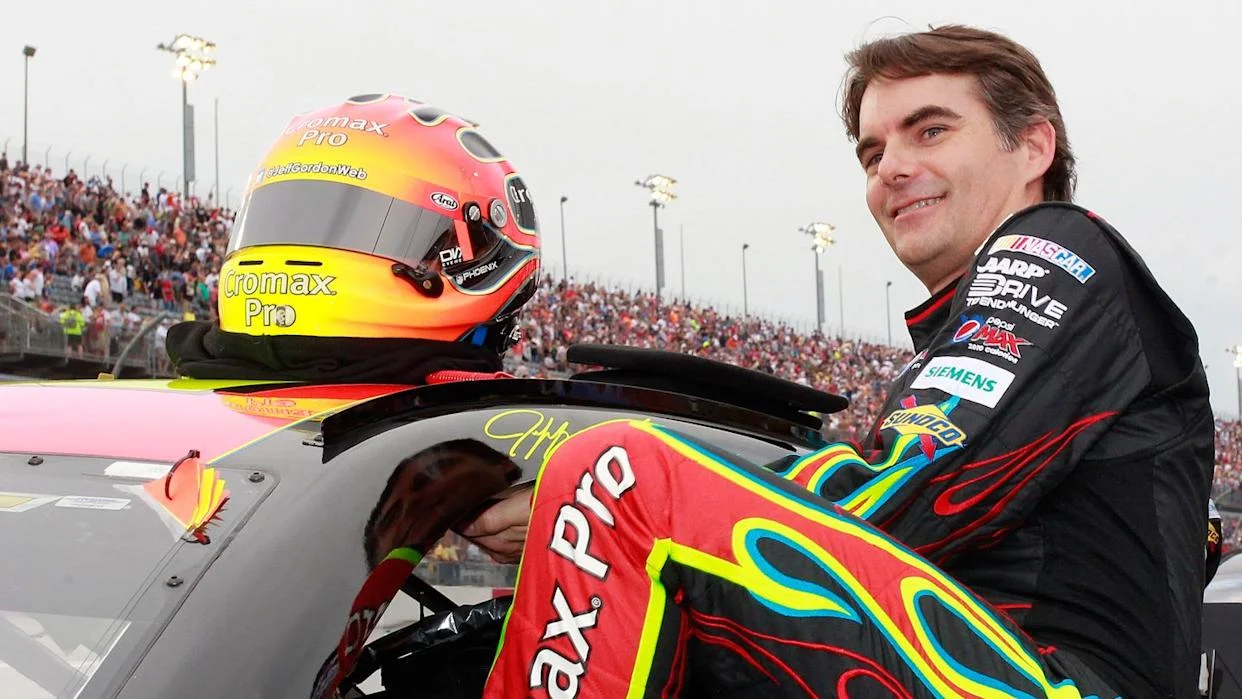The financial struggles of even the most successful teams have come into focus after Jeff Gordon shared that his NASCAR organization hasn’t seen profits in a decade, drawing wide attention to the issue of Jeff Gordon NASCAR team financial struggles. The situation has ignited heated discussions within the motorsport community, especially after Kenny Wallace offered his blunt perspective on why even top-tier NASCAR outfits face immense monetary burdens.
Jeff Gordon’s Comments Ignite Questions About Financial Reality in NASCAR
A revealing moment occurred last year when Jeff Gordon, a four-time Cup Series champion and now vice chairman at Hendrick Motorsports, appeared on a podcast with Dale Earnhardt Jr. During the episode, Gordon disclosed that Hendrick Motorsports, a fixture at the very top of the NASCAR hierarchy, had not turned a profit during the previous ten years. This admission astonished fans and suggested that financial difficulties were not limited to struggling teams but affected organizations across all levels.
Although several months have passed since Gordon’s statement, the topic has gained renewed attention on social media. Fans, shocked by the idea that championship organizations could be running at a loss, have reignited a debate about NASCAR’s underlying business model and its overall sustainability. The revelation raised deeper questions about whether the sport is structured for profit or if its survival depends entirely on the commitment and resources of its wealthiest stakeholders.
Kenny Wallace’s Unvarnished Take on Team Finances
Amidst the rising conversation, one fan reached out to Kenny Wallace, a veteran driver and outspoken commentator, asking for insights into Gordon’s startling claim. Wallace did not hesitate to speak candidly about NASCAR’s unique economic structure, taking to X to share his perspective.
“Racing is not (real business).
It’s a sport.
Real business is like a car dealership or real estate.
NASCAR’s success relies on wealthy car owners like Roger Penske and other people that make money through real businesses.”
— Kenny Wallace (@Kenny_Wallace), August 28, 2025
Wallace’s remarks emphasized the unusual nature of NASCAR finances. While some revenue flows in from sponsorships, television deals, and prize winnings, most teams do not function as profit-driven businesses. Instead, their continued existence depends largely on car owners and investors—people like Roger Penske—whose primary financial gains come from industries outside racing.
This admission echoes what industry insiders, teams, and even fans have long suspected: NASCAR teams are kept afloat not by operational efficiency or lucrative returns, but often through the deep pockets and passion of private backers. For many, racing remains more a labor of love than a money-making venture, regardless of competitive results or public spectacle.
The High Cost of Running a Top NASCAR Team
The expense of participating at NASCAR’s highest level explains much of the struggle. Operating a Cup Series team requires tens of millions annually, with costs spanning from advanced car development, salaries for teams of specialized engineers and mechanics, to the logistics of travel, equipment transportation, and ongoing vehicle maintenance.
Even with robust sponsorship portfolios or consistent prize winnings, expenses almost always outpace income. The result is a relentless financial squeeze which, as Gordon’s revelation and Wallace’s commentary underscore, leaves even the most successful organizations searching for ways to stay afloat. Engineers, crew members, and leadership must constantly balance competitiveness on track with harsh economic realities off it.
Hendrick Motorsports, despite its prominent place in NASCAR history and its array of championship trophies, is not immune. Gordon’s openness has forced a re-examination of how business is done in the sport, and why so few see returns on what is frequently a multi-million dollar annual investment.
Implications for NASCAR’s Future and New Entrants
The financial disclosures have sparked broader questions about the long-term health of NASCAR. If even its most iconic teams, staffed by skilled engineers and basking in public acclaim, struggle to break even, the prospects for smaller organizations or potential new entrants grow dimmer. The debate has drawn in listeners from across the motorsports world, as fans and analysts alike consider whether the current structure is sustainable for teams and for the sport itself.
For fans, the candidness from Gordon and the emotional intensity of Wallace’s commentary have dispelled illusions about the glamorous side of racing. Instead, the reality is a landscape shaped by intense competition, demanding logistics, and a reliance on individuals whose fortunes were often built far from the racetrack. This underlying structure may be the only thing keeping many organizations alive.
Looking ahead, the question of who will be able or willing to fund the future seasons remains open. The sport’s dependence on wealthy owners and outside business success stories like Roger Penske reveals a system under strain. Unless NASCAR’s financial model evolves, the issue of Jeff Gordon NASCAR team financial struggles could become an even more central concern for drivers, owners, and fans alike.
